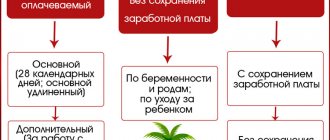Home / Labor Law / Vacation
Back
Published: 06/09/2016
Reading time: 10 min
0
1140
An annual vacation period is provided to all working citizens in accordance with the Labor Code. In addition, there are additional days of rest and vacation periods that are not directly related to work (for example, women are entitled to such rest before childbirth).
Regulation of issues related to the procedure for granting vacation periods and their registration is carried out by employers under several articles of the Labor Code. This is done depending on the category of workers to which the employee belongs .
The duration of the vacation period, as well as the right to receive it, may differ depending on the category of the employee. For example, there are preferential categories for which vacations are issued regardless of length of service at a particular enterprise.
- Vacation concept
- Annual or basic paid leave
- Extended vacation
- Additional paid leave
- Study leave
- Administrative leave
- Maternity leave
Kinds
According to the norms of the Labor Code, an employee can exercise the right to rest by submitting a written application to management for the following types of leave:
- annual;
- maternity leave;
- additional (educational, etc.);
- child care;
- no content.
These types of vacations vary in duration, may be paid or not, and are provided under special conditions depending on the specifics of the production process.
Classification of vacations in Russia
The legislative framework of the Russian Federation distinguishes several types of recreation.
Depending on the legal meaning, conditions of exit, duration and payment, there are such types of vacations as:
- basic;
- preferential (additional);
- special;
- elongated;
- unpaid.
The procedure for granting, the amount of vacation pay and the rest time for each type of vacation are different. In addition, the difference is expressed in the circumstances due to which rest was required.
Paid annually
This type of guaranteed rest is the main one and is provided annually for a certain period of time worked. The basic duration, without taking into account the specifics of the position held, for the specified type is 28 days.
Certain categories of citizens have the right to a longer period of paid annual rest. Among them:
- teachers and other educational workers - from forty-two to fifty-six calendar days, depending on the type of institution, its status and location. What other types of leave under labor legislation are provided for this category of citizens can be clarified in the Labor Code of the Russian Federation;
- minor workers – 31 days;
- judges, prosecutors, civil servants, rescuers, researchers - from 30 to 48 days;
- disabled people – 30 days;
- persons engaged in specific production, including those associated with the creation of chemicals. weapons - 49 - 56 days.
All types of leave are provided after the relevant documents have been completed. So, for annual leave it is:
- schedule in form T-7;
- order (form T-6 and T-6a);
- note-calculation in form T-60.
Basic and additional funded leave
In regulatory legal acts, this type of vacation has several names: annual financed vacation, annual vacation, regular vacation, etc., all these terms are synonymous.
Annual financed vacation consists of all types of financed vacations that are provided to the employee during the year worked.
Annual rest is provided to employees so that they can recover both physically and mentally. Since a person is not able to work all year round. Without rest, a person quickly becomes exhausted, his performance decreases, and his health also deteriorates. In this regard, vacation is an important necessity.
Legal respite from work is divided into 2 types: preferential and basic. Previously, it was divided into preferential and regular. The concept of regular rest is still used, since employees take a break in the order of priority that exists in the organization.
Preferential and basic rest have many distinctive features. Their differences are mainly expressed in the amount of vacation days, the procedure for leaving and the reason for leaving. Their common features are that they are provided for rest for work activities.
The main vacation is provided for a long period of time and is single and whole. However, this does not prevent you from dividing it into parts and resting several times a year. The main rest is given to absolutely all employed citizens, regardless of the field of activity, place of work, position and nature of the activity.
Preferential leave is not given to all employed citizens, since its provision depends on the place of work, working conditions and its type.
Thus, additional leave is provided to people:
- Activities that involve working conditions that can cause harm to a physical or mental state, as well as the conditions of which pose a threat to life. This may include people whose work is carried out in mines, in areas with high levels of radiation. Their activities have an extremely negative impact not only on the physical state, but also on the psyche. This is due to exposure to harmful chemical and biological substances. Therefore, they need additional time to recover.
- Whose schedule is irregular. The number of additional days off for people with irregular schedules is determined by the terms of an individual agreement or a collective agreement. However, the number of days off should not be less than 3 days. The employer has the right (but only with the voluntary consent of the employee) not to provide additional days off to his employees, but then he is obliged to pay them compensation. Compensation is paid according to the overtime compensation rules. In this regard, the director of the enterprise will need to take into account the days on which employees worked in excess of the established norm (more than 8 hours).
- Workers carrying out their activities in the northern territory of the country. The employer must give them an additional respite of 16-24 working days.
The list is not exhaustive.
In addition to the above categories, additional rest is also provided:
- People working in public service.
- For employees of the prosecutor's office - from 5 to 15 days. The number of days off depends on the time worked, rank and position.
- People affected by radiation caused by the disaster at the Chernobyl nuclear power plant. The day off is provided for 14-21 days. The number of non-working days depends on the remoteness of the area.
- People who suffered from radiation caused by testing at the Semipalatinsk nuclear test site. They are given a rest period of exactly 2 weeks.
- People working in the field of education. However, additional leave for this category of workers is provided only once every 10 years of continuous work in the field of education. The duration of the vacation should not exceed 1 year.
The conditions and procedure for granting this type of leave are determined by agreement with the director and the charter of the institution.
In other cases, the employer independently decides whether to provide additional rest to his employees or not. The employer has the right to provide additional rest selectively to its employees: for good results, for a large amount of work done, etc.
Additional paid
Working citizens have the right to additional rest time:
- in the Far North and areas equivalent to it;
- at enterprises with the presence of dangerous and harmful factors;
- with an irregular schedule, etc.
The duration of additional leave may vary and has no maximum value. It can be used by a person aimed at studying, and then in this case it is called educational. It is provided upon presentation of a summons certificate. It is regulated by Chapter 26 of the Labor Code.
Features of the educational
Like all types of leave, labor legislation clearly defines the conditions and duration of release from work during study, dividing it into paid and unpaid.
1. With payment The average salary is maintained in cases where the employee goes to study at a university that operates in accordance with legal standards and has accreditation, for correspondence or evening (mixed) study, for:
- passing tests and exams - 40 days in the first and second years, 50 days in the following courses;
- up to four months to submit the final work and prepare for it.
Employees undergoing training at lower-level institutions (secondary colleges) have the right to be absent from the workplace upon completion of their studies for the duration of:
- 30 days for periodic certification in the first two courses and 40 days in the following courses;
- two months to submit the final work.
Workers studying in primary education institutions can count on 9 days and 22 days upon graduation
2. Without pay Study leave can be granted without pay:
1. university students:
- if necessary, leave for the entrance examination – 15 days;
- for submitting the final work – 15 days;
- Full-time students have 15 days to pass current exams and 4 months to defend their final work and prepare for it.
2. students studying at lower level institutions:
- for those taking entrance exams – 10 days;
- full-time students for passing current exams - 10 days and two months to defend the final work and prepare for it.
Maternity leave
Exemption from work due to pregnancy and childbirth is guaranteed by Article 255 of the Labor Code of the Russian Federation.
Regulations for all types of leaves and the procedure for their provision are contained in the Labor Code. Regarding the described case, the following points should be highlighted:
- provided to a female employee who has presented a sick leave certificate issued at the antenatal clinic;
- issued at the fetal stage from 28 to 30 weeks;
- Leave is divided into prenatal and postnatal. Its duration is: 70/70 days for normal labor, 70/86 days for difficult labor, 84/110 days for the birth of several children and multiple pregnancies.
A woman on maternity leave who receives appropriate contributions from her workplace also has the right to receive state benefits.
Procedure for granting annual leave
Annual leave for employees of any institution, company or organization is provided on the basis of a special schedule, which is mandatory for all structures. It is formed in the prescribed manner and approved by the employer, at most, two weeks before the start of the calendar year in which it is planned to provide leave to staff. It should be borne in mind that some categories of people have the right to use the main annual paid leave at a convenient time directly for them. It is advisable to include here:
- Workers who have not reached the age of majority.
- Employees who are honorary donors.
- Workers whose activities are associated with radioactive effects of absolutely any type of nuclear installation. It is worth adding that this provision also applies to the performance of work at emergency nuclear facilities, exercises, tests, etc.
- Participants of the Second World War, Heroes of the Russian Federation and the USSR.
- Heroes of Socialist Labor, as well as full holders of the Order of Labor Glory.
You need to know that the right to this type of leave becomes available to a person who has worked for one employer for at least 6 months. Moreover, in the second and subsequent years it is mandatory to provide rest at absolutely any time of the working year. In addition, daily leave that occurs due to an agreement between the employee and the employer may be divided into parts. Moreover, one of these periods must be at least 14 days.
Child care
Being a separate type of leave, according to labor legislation, it can be received by a woman for a period of up to three years. Details of registration are specified in Article 256 of the Labor Code of the Russian Federation. The counting of the days of the specified leave begins after the end of the maternity leave period. It can be used as a whole or divided into parts among family members.
Please note that any family member or person recognized as a guardian has the right to parental leave. During the period of release from work, the caregiver retains his salary, job and the right to receive all benefits and benefits. Time spent outside the workplace is included in the length of service.
general information
Types of labor leave are a certain number of calendar days (excluding holidays) that are given to the employee so that he can rest and restore his ability to work . During this period, the employee of the enterprise retains his position and average earnings.
IMPORTANT. The right to leave is reserved for employees of all organizations - commercial and non-profit, large companies and small individual entrepreneurs. Vacation is issued on the basis of an employment contract, just like vacation pay. With a “white” salary, their size corresponds to the legal norm; with a “gray” salary, it is calculated from the official part of earnings.
The company is obliged to send everyone who works under a contract on paid leave.
They are basic and additional (for special working conditions).
Separately, the law provides for social leave, such as child care and educational leave.
They are not intended to restore working capacity , but are also regulated by law.
Without content (save salary)
Temporary release from work without maintaining salary for the corresponding period is the right of a citizen who has good reasons for receiving it. Labor legislation does not regulate the duration of this type of leave. It is determined in contractual form between the employee and the employer.
Please note that some groups of people cannot be denied temporary leave from work without pay. This:
- disabled people – up to 60 days a year;
- relatives of military personnel or a number of categories of officials who died in the line of duty - up to 14 days a year;
- for pensioners – up to 14 days a year;
- workers registering a marriage, burying relatives or on the occasion of family expansion - up to 5 days a year
Administrative leave
The law also provides for the possibility of receiving an unpaid vacation period. Usually such rest is required for valid reasons.
It is drawn up on the basis of a written request from the employee, reflected in the application, and always in agreement with management:
- up to 35 days in each working year are due to WWII participants;
- pensioners who continue to work can claim two weeks of rest without pay;
- the same number of days of rest are given to family members of soldiers who died in the line of duty or as a result of injury;
- disabled people who continue to work in an organization or enterprise receive an additional 60 unpaid vacation days;
- if there is a birth of a child, a wedding or the death of a relative, up to five calendar days are provided;
- unpaid vacation days may also be provided in other cases if this is provided for by local regulations (for example, a collective agreement).
The maximum period of sick leave - find out with us! When a pensioner is dismissed, the employer is obliged to pay him benefits like any other employee. Read more about this here. For delayed wages, the employee is entitled to compensation. You will learn how to calculate it in this article.
Grounds for refusal to provide
The Labor Code, which defines the types of leaves and the procedure for their provision, allows for the possibility of refusal in a limited number of cases. A refusal by the employer will be legal if:
- basic paid leave was requested for time worked that does not correspond to the minimum period required for its provision (6 months);
- you need a student leave, but without presenting a certificate of summons from the place of training;
- unpaid leave is required, but there are no reasons for providing it;
- Other reasons mentioned in the Labor Code of the Russian Federation or the employment contract are also relevant.
An employer may not refuse to provide leave of any kind provided that all legal requirements are met. In cases of unlawful refusal, the employee has the right to seek justice and proper rest time through the court. Moreover, most of the lawsuits on the mentioned fact are resolved in favor of the employee.
The concept of the annual right to rest
According to the Labor Code of the Russian Federation, vacation is a period of time when an employee is released from his duties on weekdays for rest or other purposes while maintaining his position.
The entire working population of the country is entitled to rest time. This right is not affected by what organization a person works for, commercial or not, in a huge enterprise or in an individual entrepreneur. Registration of leave and calculation of salary for this period is carried out on the basis of an employment contract.
Only official earnings affect calculations. With a “gray” salary, only the part carried out according to official documents will be taken into account.
Controversial issues
From time to time, employees encounter certain difficulties in obtaining the required rest. Therefore, it is not enough to know what types of vacations there are. It is more important to be aware of what is due and when. Let's name the most common mistakes made by employees:
1. The employer refuses to provide study leave, although there is a summons certificate.
In such a case, you should not respond to threats of dismissal and other manifestations of psychological pressure. The right of a subordinate to study and the corresponding release from work for the required time is clearly stated in the Labor Code. The employer's actions are illegal and can be appealed in court.
2. Management refuses to issue annual leave in full, providing it only in parts.
A frequently practiced method of saving among Russian companies. Having a need for the full amount of rest days provided by law, an employee may not agree with management’s requirements to divide the vacation into parts. Leave can be divided solely at the will of the employee.
3. The administration considers all the reasons for granting leave without pay to be not compelling, refusing release from work for the required period.
Good reasons for temporary absence from work without pay may be:
- family circumstances - birth of a child, death of a relative, wedding, etc.;
- personal circumstances - a visit to a doctor without opening a sick leave, a subpoena, etc.;
- circumstances of a public nature - participation in an official event, work on trade union issues, other circumstances.
Important to consider!
If the expectant or young mother has less than two years of work experience, the payment is calculated on the basis of the amount actually earned for the total time of work. The result obtained is also divided by 730. In the case of work experience for the last two years of no more than six months, the total monetary amount is calculated according to the minimum wage. If the expectant mother is studying full-time at a university or secondary vocational education institution, the amount of the benefit is determined depending on the amount of the scholarship. Moreover, training on a budget or contract basis is not taken into account here.
When the expectant mother conducts economic activity (entrepreneurship), subject to periodic payments of at least six months to the Social Insurance Fund, she also has the right to receive financial assistance from the state. The employer pays the amount of maternity benefits from the company's cash desk within a period not exceeding ten days after the employee provides the necessary documentation. Further, the corresponding expenditure item is reimbursed from budget funds, and in full.









